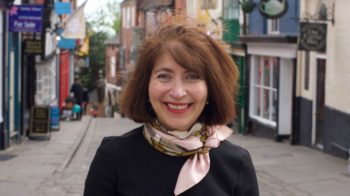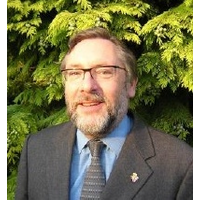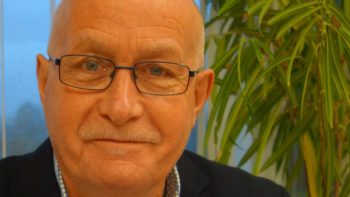All seven candidates in the contest to become the next MP for Lincoln have taken part in a hustings event at the Engine Shed to face difficult questions from students.

The debate, held last night, was an initially tranquil affair as candidates gave five minute speeches on why voters should back them at the ballot box.
But as the audience were given their chance to pose questions directly to individual candidates, the atmosphere became gradually more robust with some candidates even drawing laughter from the crowd.
Karl McCartney – Conservative

Kicking off proceedings was the Conservative Party candidate Karl McCartney, who was previously the MP for Lincoln from 2010 until 2017.
In his opening speech, Mr McCartney said that the reason this election was being held was because “Brexit hasn’t been achieved.”
He said it was critical that the 2016 referendum result was delivered so that the country could move on with the Conservative Party’s domestic agenda, including the recruitment of 20,000 police officers across the UK.
In terms of his previous record, Mr McCartney said that he’d fought for various things for the University of Lincoln including the medical school currently being built.
He said: “The new medical school won’t only help the university but also health services across Lincolnshire.
“I also helped Bishop Grosseteste University to become a university, I don’t know whether I’m allowed to mention them here.”
On his future plans, Mr McCartney said that transport would be one of his priorities if he were elected as Lincoln’s MP, citing a park and ride scheme as a one of the policies he would fight to deliver.
When it came to questions from the audience, Mr McCartney was quizzed on allegedly paying his wife a taxpayer-funded salary to be his office manager that was above the average.
Responding to the member of the audience who posed that question, Mr McCartney said:
“I don’t think you’re claims would stand up in an interview and I don’t think you possess the correct mathematical skills.
“I don’t think I could find anyone else other than my wife who would spend a Sunday evening with me going through e-mails after putting our kids to bed.
“I think my expenses stand up very well against your current Labour MP, if you want to look at value for money you get much better value for money with a Conservative MP.”
Mr McCartney was also questioned on his voting record in terms of gay rights and his vote in Parliament against gay marriage when he was Lincoln’s MP.
He said that he stood by his public voting record but added that the “record is a long time ago and people have moved on and I’ve moved on.”
A later question surrounded the use of social media after Mr McCartney faced calls to stand down as an election candidate by the Hope Not Hate group after it was revealed that he had re-tweeted far-right figures including Stephen Yaxley-Lennon (more commonly known as Tommy Robinson).
On social media, Mr McCartney said: “Re-tweets aren’t endorsements.
“I’ve re-tweeted the Labour candidate and what she’s said about Chris Williamson who’s the biggest anti-Semite you’ll find.
“I’ve re-tweeted a former SU President who claimed that Karen Lee had called students a disease.”
On that particular claim, Karen Lee demanded that she be allowed to respond to it and she said: “Mr McCartney has made this spurious claim but it has to stop it is simply, absolutely untrue and I’ve spoken to Labor party lawyers about it.”
Mr McCartney was also questioned on how he could accept Boris Johnson as the leader of his party given a column Mr Johnson wrote before he became Prime Minister when he described Muslim women as “letterboxes.”
Mr McCartney said: “If I’d have been an MP I’d have backed Boris as leader.
“He’s re-energised politics, it’s been boring and stale, and he is our Prime Minister.”
Reece Wilkes – Brexit Party

Next up was the Brexit Party candidate Reece Wilkes, a University of Lincoln graduate currently working as a lawyer.
In his opening speech, he cited policies from the party’s ‘contract with the people’ which he said was far more credible than the manifestos offered up by the other parties, adding: “We all know that manifesto is a dirty word.”
Policies he highlighted included the party’s wish to abolish the House of Lords, which Mr Wilkes described as a “bunch of pompous old men.”
He also said: “We will scrap interest loans, students are constantly trying to wriggle out of debt – it’s like quicksand.
“We will also scrap the BBC licence fee – which is a lot of money for people to be paying to a corporation which isn’t really delivering services for the 21st Century.
“In terms of universities, we want to champion freedom of speech.”
Questions for Mr Wilkes included why he wanted to abolish the House of Lords given that it was “unique across the world in its level of expertise.”
Responding to that, he answered that “expertise doesn’t mean they’re accountable”, claiming that “these people are so detached from reality” and that there are “very little ethnic minorities in the House of Lords.”
Another question for Mr Wilkes asked what he would do to make ethnic minorities feel welcome in Lincoln.
Answering this, Mr Wilkes claimed that proportionally, there was far fewer ethnic minorities in Lincoln compared to cities such as Birmingham.
He then went on to say that he has a friend “who would be classed as an ethnic minority.”
This statement drew slow clapping and laughter from some members of the audience, prompting a furious response from Mr Wilkes who said that audience members who clapped should be “ashamed of themselves” because “racism isn’t funny.”
He then claimed that last night’s audience was “biased” and “overwhelmingly pro-Labour.”
Still on the question around making ethnic minorities feel welcome in Lincoln, Mr Wilkes claimed that the Labour leader Jeremy Corbyn had failed to deal with allegations of anti-Semitism within the party.
This claim drew a passionate response from a Jewish member of the audience who heckled Mr Wilkes saying that he isn’t offended by Mr Corbyn and that Mr Corbyn has been “fighting racism all his life” – prompting a large round of applause from the audience.
Answering a later question on safety on social media, Mr Wilkes said: “You do get trolls online because they’re cowards and can’t say it to your face – I’ve been accused of homophobia and I’m gay so how ridiculous is that.”
Caroline Kenyon – Liberal Democrats

Next in the proceedings was the Liberal Democrat candidate Caroline Kenyon, a businesswoman who sits on the advisory board of the University of Lincoln’s business school as well as running her food and drink awards company.
In her opening speech, she focused on the party’s core pledge to revoke Article 50 and stop Brexit.
She said: “I joined the Liberal Democrats with one goal – to represent this wonderful city of Lincoln and stop Brexit.
“We live in a country which is the most unequal in the Western world after America.
“We have eight food banks in this little city and what are we doing? We are ripping ourselves away from the world’s biggest trading bloc.”
Ms Kenyon then went on to cite her party as a “fresh choice”, adding: “Boris Johnson is a man steeped in the illegalities of the Leave campaign.
“In terms of Jeremy Corbyn, you can only look at the mis-management of his party in regards to the claims of anti-Semitism.”
A question for Ms Kenyon included why students should trust the Liberal Democrats after they trebled tuition fees in the Coalition Government despite them promising not to raise them during the 2010 General Election campaign.
This question drew a round of applause and a standing ovation from some members of the audience.
Addressing that issue, Ms Kenyon said that she “held her hands up” in regards to the Liberal Democrats “getting things wrong” during their time in the Coalition Government.
She added that the party leader at the time, Nick Clegg, had delivered a “heart-felt apology” on the issue and that it was a Labour government that first introduced tuition fees.
Other questioners asked how Ms Kenyon could justify the party’s policy to stop Brexit and whether she had considered if it could cause “civil disturbance.”
She said that the party had tried 17 times to get a second referendum through the House of Commons, but claimed that this election was a “proxy referendum” and so if they formed a government, they would have a mandate to stop Brexit.
Answering a later question on social media safety, Ms Kenyon said: “GDPR in the EU is the gold standard of data protection globally, as a little country we’re going to be far less able to regulate these countries outside of the EU.”
Charles Shaw – Liberal Party

The Liberal Party’s Charles Shaw was the next to face the audience. Mr Shaw was formerly a councillor with the Liberal Democrats but joined the Liberal Party earlier this year primarily over the Liberal Democrats’ Brexit policy.
In his opening speech, Mr Shaw took aim at Ms Kenyon’s claim that the UK was “ripping itself from the world’s richest trading bloc.”
He said: “I think [a statement like that] says a lot about what other parties’ policies are about.
“The Liberal Party puts freedom first. It puts the importance of people being able to have different views but work together first.”
Mr Shaw also described the NHS as a “large monolith” which we “haven’t got control of with people at the coal-face suffering and those at the top getting huge salaries for re-arranging desks and meetings.”
He finished by saying: “We’ve a problem in the way we’re running the world – but we’ll put freedom first.”
A question for Mr Shaw asked him if the Liberal Democrats’ Brexit policy was the only area in which he disagreed with them.
Mr Shaw responded by saying: “There are lots of things that we disagree with the Liberal Democrats on like the voting system where parties select local candidates in central office, sometimes flying people in with no local connections.”
But addressing Brexit policy, Mr Shaw added: “The referendum was possibly one of the most straight-forward questions we’ve ever been asked.
“The intellectual consensus is that the peasants got it wrong.
“This country’s not divided, some people who dared to speak out have just been treated in an appalling way.”
Sally Horscroft – Green Party

Sally Horscroft was next, standing for the Green Party. Ms Horscroft is a long-standing environmental campaigner.
In her opening speech, Ms Horscroft said: “I’m standing because I’m angry.
“I’m angry about the rise in hate speech and bigotry. I’m angry about the policies which have led to rising homelessness. I’m angry about the rise in food banks.
“Our policies include a universal basic income. We would roll back the privatisation of the NHS. We would scrap tuition fees.
“Politicians must be honest with you, none of it matters if we don’t tackle climate change.
“Climate science has told us for decades that if we don’t act now, our future will be very different.”
Questions for Ms Horscroft included how the Green Party would entice people out of their cars and why the party’s message “didn’t seem to be cutting through.”
She blamed the “right-wind media” for the party’s message on climate change not cutting through as well as “oil companies wanting to protect their profits.”
In terms of enticing people out of their cars, Ms Horscroft said that she would improve public transport and make it cheaper than driving.
Responding to a question on social media safety, Ms Horscroft said: “Those who know me will tell you that I know very little about technology, but my policy is that if I wouldn’t say it to your face I wouldn’t say it.”
Karen Lee – Labour Party

Karen Lee was next in the proceedings, standing for the Labour Party. Ms Lee has been the MP for Lincoln since 2017 following a career as a nurse and also as a former Mayor of Lincoln.
In her opening speech, Ms Lee cited her work as Lincoln’s MP saying: “I campaigned to save the walk-in centre, RAF Scampton and I’m still campaigning against the re-location of the Red Arrows and the closure of the Usher Gallery.”
She closed by saying: “Compassion will be at the heart of a Labour government and we’ll end homelessness within five years.
“I will make sure that Lincoln is a compassionate place where community prospers.”
Ms Lee began the session of questions by issuing an apology over the way in which the Labour Party has dealt with claims of anti-Semitism within the party.
She said: ““I apologise unreservedly for the hurt that’s been caused to the Jewish community and our party has been too slow in dealing with it.
“But I’m not an anti-Semite and neither is Jeremy Corbyn.”
Ms Lee was asked if she was confident of victory given national polls suggesting the opposite for Labour.
Ms Lee responded by saying that nationally, the only poll that mattered was on polling day and that locally, she was confident of a Lincoln victory.
An audience member asked Ms Lee a Brexit-related by question by saying: “Do you think the phrase “neutral leader” is an oxymoron, or does the party take a neutral stance on rhetorical devices as well?”
Ms Lee responded by saying that Labour was the only party standing in the election that would “bring the country together” by re-negotiating a deal and then putting it “back to the people.”
She added that the party was “listening to both sides of the debate.”
Another question surrounded Labour’s economic policy and whether people under £80,000 would pay any more tax.
Ms Lee responded by saying: “I think the Tory manifesto has been written on the back of a fag packet but our manifesto is costed and 161 economists say that Labour’s manifesto does add up.”
Answering the question on social media safety, Ms Lee said: “I get some really nasty stuff, I think in public life you have to have really high standards in terms of what you tweet and re-tweet.”
Ms Lee later faced an accusation from one audience member that she hadn’t responded to e-mails sent by disabled families asking her for help as MP.
Ms Lee responded: “I would refute that claim, you’re wrong on that.
“If nothing is replied it means it hasn’t got through and you’d think if that was the case they’d ring up.”
Rob Bradley – Independent

Finally, the independent candidate Rob Bradley faced the crowd. Mr Bradley runs an architectural company and is the current chairman of Lincoln United football club.
In his opening speech, Mr Bradley: “Our system of government is snail-paced when it needs to act quickly. Brexit is an extreme example of how the system doesn’t work.
“From day one all parties should have got round the table, such is the seriousness of the situation, but instead we’ve had squabbling and it’s made our system a laughing stock.
“Good governance is about accountability and transparency. It means answering questions head-on and honestly.
“A vote for me will mean that you’ll be represented by a person free from any other influences.”
Mr Bradley also explained how he would operate as an MP by saying: “I will set up a people’s forum of good local people who have no political connections.
“We’ll agree what’s best on all the opportunities and challenges facing Lincoln.”
Questions for Mr Bradley included whether he was concerned about splitting the vote of other parties by standing as an independent candidate.
He responded by saying: “Difficulties faced by other local candidates at the ballot box is not my concern.
“Democracy means having the chance to put your own point of view across.”
Another member of the audience asked Mr Bradley how he would vote on Boris Johnson’s Brexit deal if the Conservatives were to win the election.
Mr Bradley responded by saying that he would take the view of his people’s forum.
On social media, Mr Bradley said he was “shocked” by some of the things he had seen on social media.
Post-hustings interviews
The Linc managed to grab a brief chat with Karl McCartney and Karen Lee following the event.
Mr McCartney told us: “I think tonight very well and I enjoyed it.
“There’s always a good bit of cut and thrust but I’ve got no problem with that.
“It’s unfortunate when people get their facts wrong. I don’t mind debating with people who want to use statistics that stand up to examination – but it’s good to see people who are passionate about politics.
“You could see the questions that were written by the Labour candidate and her team. They were well planted, well written and well read-out.
“There’s lots of people who were here supporting all of the different candidates I’m sure.”
Ms Lee told us: “I think it went well, it was an interesting evening.
“As well as some of the negative stuff, we managed to talk about climate change and homelessness and anti-austerity measures.
“I think the audience were great, I thought they were really engaged because you could see people hopping up and down wanting to ask a question.
“That’s the way it should be and I’m hopeful that they’ll all go out and vote – however they vote, I welcome that.
“I’m confident of holding this seat, I’m utterly confident, we’ve worked hard.”
Stay tuned to The Linc over the next few days as we’ll soon be publishing full video interviews with all seven candidates standing in this election.

